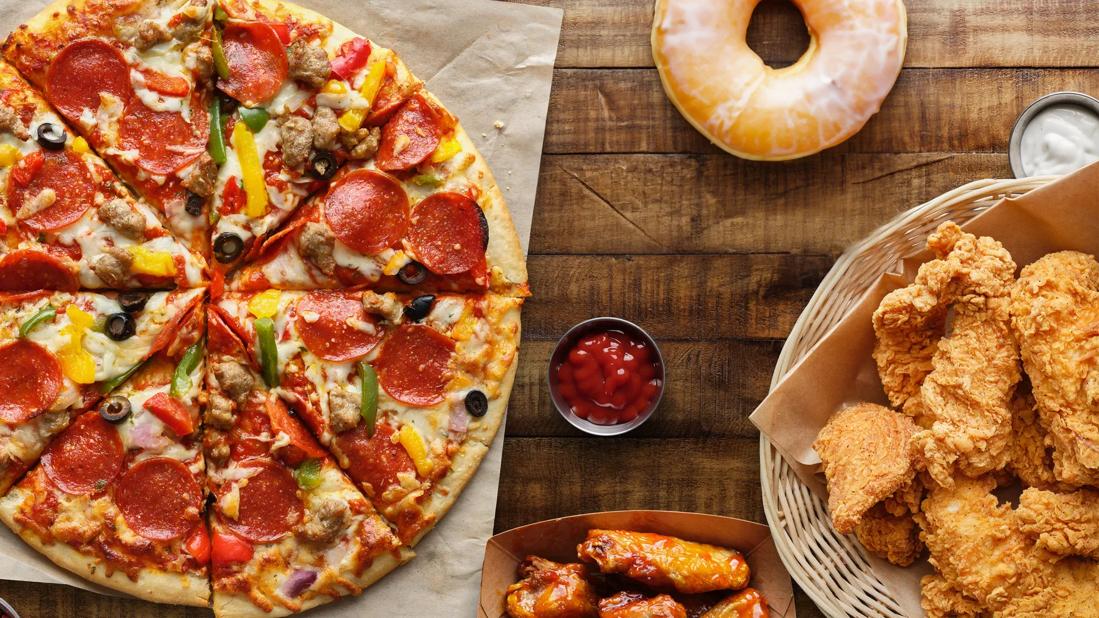Foods high in fat and sugar can lead to uncomfortable side effects like diarrhea, constipation and heartburn

As the popularity around anti-obesity medications like Ozempic®, Wegovy™, Mounjaro® and Zepbound® grows, you may be wondering if one is right for you.
Advertisement
Cleveland Clinic is a non-profit academic medical center. Advertising on our site helps support our mission. We do not endorse non-Cleveland Clinic products or services. Policy
And if that answer is yes, then you may next start wondering about the side effects that come with these GLP-1 agonist medications. For example, people using these types of medications have reported gastrointestinal (GI) side effects such as vomiting, constipation and heartburn.
“If you’re starting one of these anti-obesity medications, it’s important for you not to go into it blindly,” advises registered dietitian Beth Czerwony, RD, LD. “You should consider seeing a registered dietitian because you may have side effects and have no idea how to manage them.”
So, can you still enjoy pizza night or that bowl of cereal in the morning? It all depends on how your body reacts to the medication — if you’re experiencing GI side effects, you may need to tweak what you eat.
Czerwony explains the side effects you may experience if you’re on Ozempic, Wegovy, Mounjaro or Zepbound, as well as foods to avoid and what you should be eating.
While many people are happy with how these medications help with weight loss, they may also have to deal with side effects from GLP-1 agonist medications, such as:
“GLP-1 agonists slow down how fast your stomach empties,” explains Czerwony. “The medication keeps you full for longer because it slows down how fast you’re eating.”
Advertisement
And if your diet is full of greasy or high-fat foods, you may experience indigestion, nausea, vomiting or heartburn because that food is now sitting in your stomach for longer periods of time. And if you’re not eating enough fiber, you may experience constipation or even diarrhea.
“Any of these side effects can be managed with your diet and the foods you eat and don’t eat,” she adds.
Eating certain foods while taking GLP-1 agonists may increase your chance of unpleasant side effects. Foods you may want to avoid or limit include:
“Because it takes longer to digest fats, having higher fat foods will sit in your stomach and cause nausea and vomiting,” clarifies Czerwony. “Sugary drinks can also cause GI upset and should also be avoided since it’s adding in extra calories, which you’re trying to avoid to help facilitate weight loss.”
While there’s no specific “Ozempic diet” or “Wegovy diet plan,” Czerwony says eating a well-balanced diet is your best bet for feeling your best while taking Ozempic and other anti-obesity medications. Build your meals around the following types of foods:
If you’re dealing with loss of appetite and not feeling hungry, you may find that meal replacement shakes or protein shakes may help with side effects.
“You can typically digest liquids a lot easier than you can solids,” explains Czerwony. “And if you’re skipping meals, you may want to use a meal replacement shake as an alternative because that’s going to help preserve your body mass, but it’s still giving you the calories that you need.”
And focusing on getting enough protein is key, as it helps keep you full for longer and helps to stabilize blood sugar. Another reason why protein is so important is that it keeps your body from burning muscle instead of fat.
“If you respond well to this medication, you end up losing a lot of weight very quickly. And along with that is muscle mass. Your metabolism can become even less effective because you’re burning your muscle stores instead of your fat stores,” she says.
Advertisement
You also want to focus on foods that contain fiber, as this can help combat constipation. But Czerwony cautions that you need to slowly increase how much fiber you’re getting each day.
“If you don’t normally have fiber in your diet and then all of a sudden you start pushing fiber, you could end up with diarrhea just because your gut is working a little bit harder.”
In addition to adjusting what you eat, there are other steps you can take to minimize the side effects of GLP-1 agonists. Czerwony recommends the following:
Advertisement
And reframing how you eat to include healthy foods that contain protein and fiber will only benefit you in the long run.
“Using one of these anti-obesity medications isn’t just a quick, easy, short-term kind of fad diet,” stresses Czerwony. “You need to learn about your nutrition, what your body needs and how to make a lifestyle change.”
Advertisement
Learn more about our editorial process.
Advertisement

The little blue pill might help with physical arousal, but there are better treatments for low libido in women

Your body’s response to rapid weight loss from the medication may cause shedding

This medication is best used on a limited basis

Authorized take-back programs, services and drop-off locations are the best, safest way to get rid of expired medicine

These illegal supplements have negative impacts for vital organs and may cause psychosis, heart attacks and more

These creams that you apply to your skin can actually help reduce localized pain, swelling and inflammation

Popular among teens, these inhalants give you a quick high, with serious harmful effects

‘Black box warnings’ on medications outline potential risks and important instructions

Wearing a scarf, adjusting your outdoor activities and following your asthma treatment plan can help limit breathing problems

Your diet in the weeks, days and hours ahead of your race can power you to the finish line

When someone guilt trips you, they’re using emotionally manipulative behavior to try to get you to act a certain way